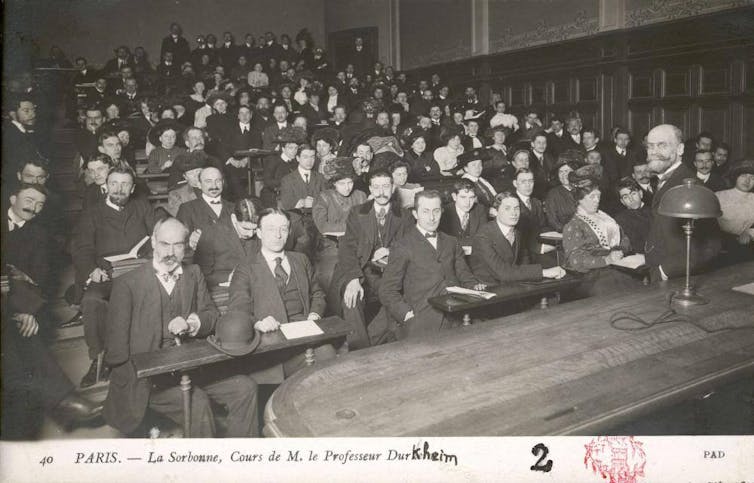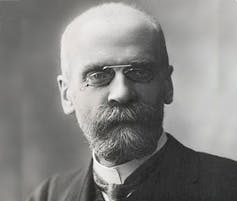Globally, we are currently experiencing tremendous social and political turbulence. At the institutional level, liberal democracy faces the threat of rising authoritarianism and far-right extremism. At the local level, we seem to be living in an ever-increasing age of anxiety, engendered by precarious economic conditions and the gradual erosion of shared social norms. How might we navigate these difficult and disorienting times?
Emile Durkheim, one of the pioneers of the discipline of sociology, died 101 years ago this month. Although few outside of social science departments know his name, his intellectual legacy has been integral to shaping modern thought about society. His work may provide us with some assistance in diagnosing the perennial problems associated with modernity.
Whenever commentators argue that a social problem is “structural” in nature, they are invoking Durkheim’s ideas. It was Durkheim who introduced the idea that society is composed not simply of a collection of individuals, but also social and cultural structures that impose themselves upon, and even shape, individual action and thought. In his book The Rules of the Sociological Method he called these “social facts.”
A famous example of a social fact is found in Durkheim’s study, Suicide. In this book, Durkheim argues that the suicide rate of a country is not random, but rather reflects the degree of social cohesion within that society. He famously compares the suicide rate in Protestant and Catholic countries, concluding that the suicide rate in Protestant countries is higher because Protestantism encourages rugged individualism, while Catholicism fosters a form of collectivism.
What was so innovative about this theory is that it challenged long-standing assumptions about individual pathologies, which viewed these as mere byproducts of individual psychology. Adapting this theory to the contemporary era, we can say, according to Durkheim, the rate of suicide or mental illness in modern societies cannot be explained by merely appealing to individual psychology, but must also take into account macro conditions such as a society’s culture and institutions.
In other words, if more and more people feel disconnected and alienated from each other, this reveals something crucial about the nature of society.
The shift from premodern to modern
Born in France in 1858, the son of a rabbi, Durkheim grew up amid profound social change. The Industrial Revolution had drastically altered the social order and the Enlightenment had by this time thrown into doubt many once-taken-for-granted assumptions about human nature and religious (specifically Judeo-Christian) doctrine.
Durkheim foresaw that with the shift from premodern to modern society came, on the one hand, incredible emancipation of individual autonomy and productivity; while on the other, a radical erosion of social ties and rootedness.
An heir of the Enlightenment, Durkheim championed the liberation of individuals from religious dogmas, but he also feared that with their release from tradition individuals would fall into a state of anomie — a condition that is best thought of as “normlessness” — which he believed to be a core pathology of modern life.

For this reason, he spent his entire career trying to identify the bases of social solidarity in modernity; he was obsessed with reconciling the need for individual freedom and the need for community in liberal democracies.
In his mature years, Durkheim found what he believed to be a solution to this intractable problem: religion. But not “religion” as understood in the conventional sense. True to his sociological convictions, Durkheim came to understand religion as another social fact, that is, as a byproduct of social life. In his classic The Elementary Forms of Religious Life, he defined “religion” in the following way:
“A religion is a unified system of beliefs and practices relative to sacred things, that is to say, things set apart and forbidden — beliefs and practices which unite into one single moral community called a Church, all those who adhere to them.”
The sacred and the quest for solidarity
For Durkheim, religion is endemic to social life, because it is a necessary feature of all moral communities. The key term here is sacred. By sacred Durkheim meant something like, unquestionable, taken-for-granted, and binding, or emitting a special aura. Wherever you find the sacred, thought Durkheim, there you have religion.
There is a sense in which this way of thinking has become entirely commonplace. When people describe, say, European soccer fans as religious in their devotion to their home team, they are drawing on a Durkheimian conception of religion. They are signaling the fact that fans of this nature are intensely devoted to their teams — so devoted, we might say, that the team itself, along with its associated symbols, are considered sacred.

We can think of plenty of other contemporary examples: one’s relationship with one’s child or life partner may be sacred, some artists view art itself — or at least the creation of it — as sacred, and environmentalists often champion the sacrality of the natural world.
The sacred is a necessary feature of social life because it is what enables individuals to bond with one another. Through devotion to a particular sacred form, we become tied to one another in a deep and meaningful way.
This is not to say that the sacred is always a good thing. We find the sacred among hate groups, terrorist factions and revanchist political movements. Nationalism in its many guises always entails a particular conception of the sacred, be it ethnic or civic.
But, at the same time, the sacred lies at the heart of all progressive movements. Just think of the civil rights, feminist and gay liberation movements, all of which sacralized the liberal ideals of human rights and moral equality. Social progress is impossible without a shared conception of the sacred.
Durkheim’s profound insight was that despite the negative risks associated with the sacred, humans cannot live without it. He asserted that a lack of social solidarity within society would not only lead individuals to experience anomie and alienation, but might also encourage them to engage in extremist politics. Why? Because extremist politics would satiate their desperate desire to belong.
Thus we can sum up the great dilemma of liberal modernity in the following way: how do we construct a shared conception of the sacred that will bind us together for the common good, without falling prey to the potential for violence and exclusion inherent to the sacred itself?
This question which preoccupied Durkheim throughout his entire life — remains as urgent today as ever before.

